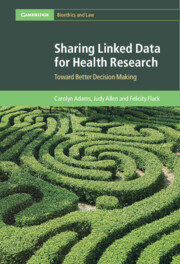Book contents
- Sharing Linked Data for Health Research
- Cambridge Bioethics and Law
- Sharing Linked Data for Health Research
- Copyright page
- Epigraph
- Contents
- Figures
- Tables
- Foreword
- Acknowledgements
- Abbreviations
- Introduction
- Part I Context for Decision Making
- Part II Frameworks for Decision Making
- Part III Practice and Process of Decision Making
- Glossary
- Index
- Cambridge Bioethics and Law
Introduction
Published online by Cambridge University Press: 02 June 2022
- Sharing Linked Data for Health Research
- Cambridge Bioethics and Law
- Sharing Linked Data for Health Research
- Copyright page
- Epigraph
- Contents
- Figures
- Tables
- Foreword
- Acknowledgements
- Abbreviations
- Introduction
- Part I Context for Decision Making
- Part II Frameworks for Decision Making
- Part III Practice and Process of Decision Making
- Glossary
- Index
- Cambridge Bioethics and Law
Summary
The future of health research around the world relies on access to data. Much of the most valuable, reliable, and comprehensive data collections are held by governments. These collections contain data on whole populations and are, therefore, a powerful tool in the hands of researchers, especially when the data collections are linked and analysed. Research using linked data has the capacity to address “wicked’ health problems and emerging global threats to health, such as COVID-19. These data collections are made up of sensitive information about the members of the community. They must only be used in a way that respects the values, interests, and rights of individuals and the community. This book provides a template for allowing access to government data collections for research in a regulatory environment that respects and protects these values, interests, and rights to build the social licence needed to support the research enterprise.
- Type
- Chapter
- Information
- Sharing Linked Data for Health ResearchToward Better Decision Making, pp. 1 - 8Publisher: Cambridge University PressPrint publication year: 2022



